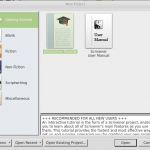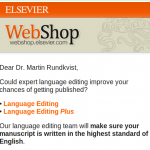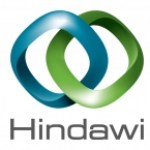Publishing
UPDATE (January 2, 2016): The makers of Scrivener have decided to abandon their Linux project. Kudos for them for giving it a try. The Scrivener on Linux users were not many, and almost nobody donated to the project, and as far as I can tell, the project was not OpenSource and thus could not have attracted much of an interest among a community of mostly OpenSourceHeads.
So, I'm no longer recommending that you mess around with Scrivener on Linux, as it is no longer maintained. Back to emacs, everybody!
Scrivener is a program used by authors to write and manage complex documents, with…
A few months ago I registered on Elsevier's clunky old on-line manuscript submissions site and submitted a paper to Journal of Archaeological Science. It got turned down because the two peer reviewers disagreed on whether it should be accepted or not. No biggie: I resubmitted elsewhere. Today Elsevier Science & Technology Journals spammed the address I submitted from with an offer of language revision!
Need help getting published? Elsevier Language services can help you
Dear Dr. Martin Rundkvist,
Could expert language editing improve your chances of getting published…
Here's a fun case of me not anticipating an imminent technological development, not thinking that last centimetre of far enough. In July of 2007, six years ago, I wrote:
Lately I have come to think of books as computer devices, combining the functions of screen and backup medium. All texts these days are written and type-set on computers, so the paper thingy has long been a secondary manifestation of the text. People like publisher Jason Epstein and book blogger the Grumpy Old Bookman have predicted that we will soon have our books made on demand at any store that may today have a machine for…
Hot on the heels of the hapless Science Publishing Group, I have received solicitation spam from another dodgy OA publisher, Hindawi Publishing in Cairo, with another odd on-line archaeology journal.
The Journal of Archaeology has 71 academics on its editorial board. And a strangely generic name. What it doesn't have is any published papers yet, after months on-line, or an editor-in-chief. So I wrote to some board members at European universities, and they replied that they thought the journal was probably legit, though they weren't exactly sure. "The lack of published papers and low…
In which we look again at the question of why, despite the image of physicists as arrogant bastards, biologists turn out to be much less collegial than physicists.
------------
While I was away from the blog, there was a spate of discussion of science outreach and demands on faculty time, my feelings about which are a little too complicated to boil down to a blog post in the time I have available. I did notice one thing in Jeanne Garb's guest blog post at Nature Networks:
Yet, given the current system, most scientists are choosing to keep a closed-notebook policy because they fear getting…
Science publishing is at a crossroads. On We Beasties, Kevin Bonham says that early scientists "communicated amongst themselves in person or in letters or in books. They shared discoveries freely and it was possible for an individual human to be aware of almost the entire sum of human knowledge." As the pace of discovery accelerated, scientific journals became instrumental in recording and disseminating knowledge. But today, while earnest researchers must "publish or perish," and millions of students stand to benefit from open access, publishers themselves are focused on turning a profit…
On Discovering Biology in a Digital World, Sandra Porter imagines the fallout of HR 3699, a bill that would eliminate the requirement for free public access to NIH-funded research papers. Porter writes, "The reasoning behind this requirement is that taxpayers funded everything about the research except for the final publication, and so they have already paid for access." In small schools and community colleges without costly journal subscriptions, passage of this bill would effectively remove contemporary scientific literature from the classroom. Porter continues, "working in science, and…
At It's not junk Michael Eisen continues to expose the shameless actions of Carolyn Maloney to sell out science for the sake of publishers like Elsevier. As we remarked last week, it seems that very little money is required to buy a representatives favor towards your industry, even if that means acting against the public interest. Now, in her defense of the Research Works Act, which undoes the public distribution of research findings paid for by the public, her response appears to have been written by Elsevier itself.
Eisen busts her in the act.
From Maloney's letter:
First, I…
Update/clarification: I want to clarify something critical. This is not about picking on a researcher or a country. It very well could have happened in the U.S. or anywhere else. I, nor you the reader, have any idea about the internal constraints these groups experience, or what was communicated to government officials. To the extent that data sharing didn't occur due to concerns over publication, this represents an instance where the publication process--and the import attributed to it--affected the need for rapid release. That's the key point, not assigning blame to individuals or…
There are two very interesting posts about scientific publishing that raise some very good points. The first post by petermr makes a critical point about the publication process--academia has ceded promotion and tenure decisions to professional editorial boards, not experts and colleagues (italics mine):
The academic system (in which I include public funders) has, by default, given away a significant part of its decision-making to the publishing industry. (I use "industry" to include non-profits such as learned societies, and like all industries there are extremes of good and bad practices…
Peer review, the process in which scientific publication has to pass muster with critical reviewers, has a lot of problems. But a widely-cited report by McKinsey & Company consulting which claimed that Obamacare will result in one-third of companies dropping healthcare coverage for their employees is worth examining (italics mine):
The predictable fallout led Democrats, and several reporters, to press McKinsey for the survey itself -- a request McKinsey has declined on the grounds that the material is proprietary.
But multiple sources both within and outside the firm tell TPM the survey…
When I was looking over the Great Discoveries series titles for writing yesterday's Quantum Man review, I was struck again by how the Rutherford biography by Richard Reeves is an oddity. Not only is Rutherford a relatively happy fellow-- the book is really lacking in the salacious gossip that is usually a staple of biography, probably because Rutherford was happily married for umpteen years-- but he's an experimentalist, and you don't see that many high-profile biographies of experimental physicists.
When you run down the list of famous and relatively modern scientists who have books written…
I found this post titled "What scientists really want from digital publishing", and, after reading it, I'm pretty certain this scientist doesn't want what's offered. Before I get to the details, here's what computer scientst Philip Bourne offers:
"as a scientist I want an interaction with a publisher that does not begin when the scientific process ends but begins at the beginning of the scientific process itself"
I actually want to do away with publishers--I see them as a necessary evil, including the Open Access ones. What I really want is to be able to communicate to other scientists (and…
Comrade Physioprof raises a point I've always wondered about:
...this old saw has been brandished:
Innovation is, and always was, higher in smaller/younger labs[.]
There is never any fucken evidence marshalled in support of this claim.
I'll admit that smaller labs can be quick and nimble, especially in comparison to large research centers. On the other hand, larger groups often have the infrastructure and financial security to pursue high risk ideas without serious risk of being derailed.
Data would be nice. I would like to think that, were it available, someone would have cited it by now.…
A recent change by Harper Collins Publishing regarding library-owned eBook has met with a lot of criticism:
The value of this magically convenient library book -- otherwise known as an e-book -- is the subject of a fresh and furious debate in the publishing world. For years, public libraries building their e-book collections have typically done so with the agreement from publishers that once a library buys an e-book, it can lend it out, one reader at a time, an unlimited number of times.
Last week, that agreement was upended by HarperCollins Publishers when it began enforcing new restrictions…
I've railed against the rise of supplemental data and methods before, but, having just reviewed a paper where I spent more time reading the supplemental sections versus the actual fucking paper, what Scicurious wrote struck a chord with me:
Sci wishes she could make her own flowchart of supplemental data. It might look like this:
Does the journal have ridiculously short page/word limits compared to the ridiculously huge amount of data they require for publication? Yes.
Are your methods way too numerous and complicated due to the ridiculously huge amount of data required for publication? Yes.…
David Dobbs asks a really good question about the effect of scientific (scholastic) publishing on communication of science to the public:
I want to consider another problem with the paper's overvaluation: it discourages scientists from engaging the public. How so? Because many seem to think that when they've finished the paper, they've finished their work.
.....A scientist in the audience said something that always gets said during such discussions: "What if you want to just do the work?" What if you want, in other words, to do the experiment or observation, analyse the data, write and…
"Hey, dude, whatcha doin'?"
"Signing these contracts. I'm not sure why they need four copies, but they do."
"Contracts for what?"
"The new book. Remmeber, the one we've been talking about these last few weeks? Sequel-of-sorts to How to Teach Physics to Your Dog? About relativity?"
"Oh, yeah, that's right! We're doing another book! Where do I sign?"
"What do you mean, 'Where do I sign?' You're a dog."
"I could, you know, put a paw print on the line, or something."
"I suppose you could, but it wouldn't be legally binding. Dogs aren't allowed to sign contracts."
"You know that's horribly…
So there's an article that a fair number of people have gotten all het up about in The Scientist which criticizes peer reivew. I'll state for the record that I agree with the article in that the review process needs to be much faster, and more people need to be reviewing (the burden is too great for some people). But I'm puzzled by this (italics mine):
Twenty years ago, David Kaplan of the Case Western Reserve University had a manuscript rejected, and with it came what he calls a "ridiculous" comment. "The comment was essentially that I should do an x-ray crystallography of the molecule…
Earlier this year, I received a charming email from a pair of Helsinki-based artists and designers who work under the name of OK DO. OK DO is a socially-minded design think tank and online publication; they dug Universe and wanted to know if I'd contribute to a new publication and exhibition project they were working on. The project, Science Poems, was perfectly up my alley: a variety of articles and work loosely structured around the "poetry and multi-sensorial aesthetics of natural sciences rather than their functionality and logic."
For the occasion, I wrote a short piece about the…



